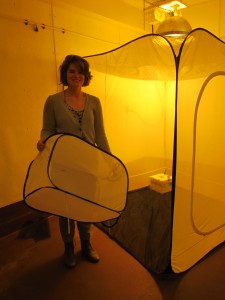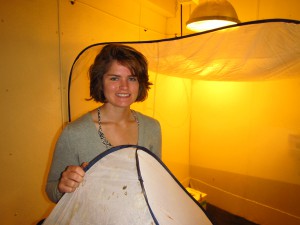Catherine Henry, Duke University

Catherine next to her bee chamber
Project: Foraging preferences of Bombus Impatiens in response to climate-stressed plants, and trends in bumblebee diversity
Advisor: Laurel Fox
As pollinators, bumblebees play a fundamental role in many ecosystems, and their response to climate change could impact ecosystem structure and function. We study the ability of bumblebees to discern between plants grown under various climate conditions. We conducted 10-minute behavioral studies of Bombus impatiens foraging on plants grown under two temperature and three watering regimes, for a total of six plant treatments. To complement this behavior study, we analyzed biodiversity data from the previous 25 years to analyze changes in bumblebee populations in the Santa Cruz, California region. Our results indicate that bumblebees displayed plant preferences, visiting those plants which were both water and temperature stressed the least. Furthermore, we found that diversity has decreased with increasing maximum daily temperatures in April and May, and decreasing diversity correlates with an increase in generalist species and a decrease in floral intensity. These results indicate that the Bombus network is less stable, and predicted climate forecasts of increased temperature and drought in California may increase bumblebee resource stress which could in turn exert a strong selective pressure on bee and plant communities.

